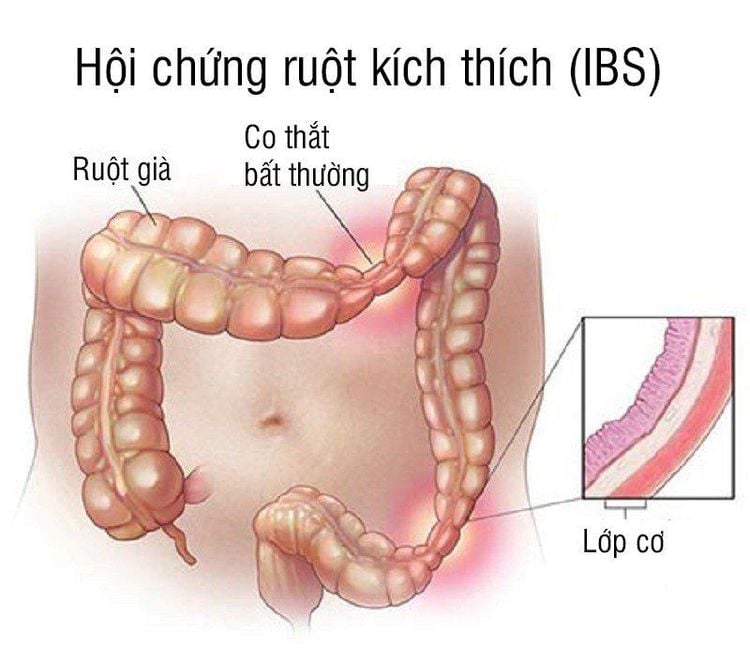This is an automatically translated article.
The article was professionally consulted by Doctor Department of Medical Examination & Internal Medicine - Vinmec Hai Phong International General Hospital
Irritable bowel syndrome is a gastrointestinal disorder characterized by abdominal pain and change in bowel habits without finding any physical damage. There are many theories about the etiology of this pathology, in which stress can trigger irritable bowel syndrome in patients with psychogenic susceptibility.
1. Irritable Bowel Syndrome
One of the most common intestinal diseases in our country as well as in the world is irritable bowel syndrome (IBS). Although irritable bowel syndrome is not life-threatening, it affects the quality of life. The disease lasts a long time, making patients always worry, stress, lose sleep, always fear other dangerous diseases of the intestine.
There are many studies in the world that have proven that IBS is a dysfunction of the gastrointestinal tract but manifests mainly as symptoms of the colon. These bowel dysfunctions often recur many times without finding any anatomical, histological, and biochemical lesions in the intestine.
Currently, thanks to modern investigations into the morphology and function of the intestine in experimental and clinical trials, it has gradually elucidated the mechanism of gastrointestinal regulation, mainly the interaction between the central nervous system and the central nervous system. Central to the enteric nervous system (brain-gut axis) - this neural network system works together to smoothly carry out the normal function of the intestines.
2. Why Irritable Bowel Syndrome?

The first is the abnormal perception of the gastrointestinal tract function such as: increased sensitivity, excitability of internal organs, changes in intestinal tolerance, decreased ability to withstand the pressure of food masses in some segments. intestinal motility disorder, increased or decreased intestinal motility.
Dysfunction of intestinal smooth muscle: the smooth contraction of intestinal smooth muscle will create a pressure difference between each segment of the intestine to promote the contents of the intestinal lumen to move from the top down at a faster rate. suitability. For some reason, smooth muscle function is disrupted, causing the intestinal pushing speed to become too fast or too slow. Rapid transit reduces the absorption of substances and water that cause diarrhea. Too slow transit makes food stay in the intestine for a long time, increased water absorption causes constipation, long-term creates favorable conditions for bacteria to grow and continue to cause diarrhea. That's why people with irritable bowel syndrome often have episodes of diarrhea mixed with constipation. The effect of certain hormones in the digestive tract: The hormone cholecystokinin is believed to be the cause of irritable bowel syndrome because it causes smooth muscle contraction leading to increased peristalsis and increased abdominal pain. This substance is released by the small intestine mucosa when eating fats or taking magnesium sulfate. Therefore, people with irritable bowel syndrome are advised not to eat fatty foods, fried foods, fried foods...
Enteric nervous disorders: disorders in the release of stimulants and other substances. Inhibitors of intestinal neurotransmitters lead to disturbances in the rhythmic contractions of the small intestine and colon that lead to symptoms of diarrhea and constipation.
3. Stress Can Trigger Irritable Bowel Syndrome

Like the heart and lungs, the intestines are controlled by the autonomic nervous system, so the function of the intestines is closely related to the central nervous system. Any psychological stress in life such as difficulty, stress, anger, sadness, fatigue, work overload... will cause excessive contractions of the large intestine and lead to symptoms of irritable bowel syndrome. Although not everyone experiences irritable bowel syndrome, irritable bowel syndrome tends to occur in people with a sensitive psychological background. Even people with only mild stress can be affected.
Measures to reduce stress include psychological adjustments such as: arranging reasonable work, setting time goals for each task, reducing overload pressure in work or study, practicing meditation, confiding in others. body, psychological counseling, regular exercise, yoga, enough sleep...
Please dial HOTLINE for more information or register for an appointment HERE. Download MyVinmec app to make appointments faster and to manage your bookings easily.













